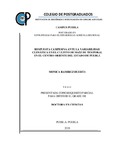| dc.contributor.author | Ramírez Huerta, Mónica | |
| dc.creator | RAMIREZ HUERTA, MONICA; 421533 | |
| dc.date.accessioned | 2018-10-29T15:27:08Z | |
| dc.date.available | 2018-10-29T15:27:08Z | |
| dc.date.issued | 2018-04 | |
| dc.identifier.uri | http://hdl.handle.net/10521/3008 | |
| dc.description | Tesis (Doctorado en Ciencias, especialista en Estrategias para el Desarrollo Agrícola Regional).- Colegio de Postgraduados, 2018. | es_MX |
| dc.description.abstract | Las respuestas agrícolas, económicas y alimentarias son parte del proceso de adaptación -del antes, durante y después- de la presencia de un desastre agrícola asociado a eventos extremos como heladas y sequías en el cultivo del maíz de temporal. El objetivo de la investigación fue analizar las estrategias de adaptación agrícolas, económicas y alimentarias que los campesinos han implementado ante la variabilidad climática en el cultivo de maíz de temporal en los municipios Chalchicomula de Sesma, San Juan Atenco y Aljojuca Puebla-México. Se realizó un muestreo aleatorio simple, al azar y sin remplazo, con un tamaño de muestra de 95 campesinos. El estudio mostró que los campesinos perciben que el clima ha cambiado; mencionan que hay menos lluvias y hace más calor; y han implementado estrategias de adaptación en el cultivo de maíz de temporal para aminorar su impacto, retrasado la fecha del barbecho, de la siembra y de la fertilización. Así mismo, una de las estrategias de adaptación económica más importante ha sido la migración laboral temporal, así como estrategia alimentaria, ambas estrategias han contribuido a mejorar las condiciones de vida de los campesinos, debido al constante riesgo de disponibilidad y accesibilidad de alimentos. Se concluyó que históricamente la variabilidad climática -heladas y sequías- han incidido en las respuestas agrícolas, económicas y alimentarias, propias de cada espacio que satisfacieron necesidades básicas y por ende la sobrevivencia. _______________ ANSWERS PEASANT IN CLIMATE VARIABILITY IN THE MAIZE OF RAINFED IN THE CENTRAL ORIENT OF THE STATE OF PUEBLA. ABSTRACT: The agricultural, economic and food answers are part of the adaptation process. - before, during and after- of the presence of an agricultural disaster associated with climate variability, mainly in extreme events such as frosts and droughts in the of rainfed maize. The objective of the research was to analyze the agricultural, economic and food adaptation strategies that peasants have implemented in climate variability in the rainfed maize in the municipalities Chalchicomula de Sesma, San Juan Atenco and Aljojuca Puebla-México. A simple, random, random sample without replacement with a sample size of 95 peasants was applied. The research showed that the peasants perceived that the climate has changed; they said that there is less rain and there is warmer; and they have implemented adaptation strategies in agriculture to reduce their impact, delayed the date of fallowing, sowing and fertilization. Therefore, the most important economic adaptation strategies has been temporary labor migration, as well as food strategy, both strategies have contributed to improve the living conditions of peasants, due to the constant risk of availability and accessibility of food temporary labor migration has contributed to improving the living conditions of peasants. The reserch conclued that historically climate variability -frosts and droughts- have affected agricultural, economic and food responses, typical of each space that met basic needs and therefore survival. | es_MX |
| dc.description.sponsorship | Consejo Nacional de Ciencia y Tecnología (CONACyT). | es_MX |
| dc.format | pdf | es_MX |
| dc.language.iso | spa | es_MX |
| dc.rights.uri | http://creativecommons.org/licenses/by-nc-nd/4.0 | es_MX |
| dc.subject | Adaptación | es_MX |
| dc.subject | Alimentación | es_MX |
| dc.subject | Desastres | es_MX |
| dc.subject | Migración | es_MX |
| dc.subject | Variabilidad climática | es_MX |
| dc.subject | Adaptation | es_MX |
| dc.subject | Food | es_MX |
| dc.subject | Disasters | es_MX |
| dc.subject | Migration | es_MX |
| dc.subject | Climate variability | es_MX |
| dc.subject | Estrategias para el Desarrollo Agrícola Regional | es_MX |
| dc.subject | EDAR | es_MX |
| dc.subject | Doctorado | es_MX |
| dc.subject.classification | CIENCIAS SOCIALES::SOCIOLOGÍA::SOCIOLOGÍA DE LOS ASENTAMIENTOS HUMANOS::ESTUDIOS DE COMUNIDAD | es_MX |
| dc.title | Respuesta campesina ante la variabilidad climática en el cultivo de maíz de temporal en el centro oriente del estado de Puebla. | es_MX |
| dc.type | Tesis | es_MX |
| Tesis.contributor.advisor | Juárez Sánchez, José Pedro | |
| Tesis.contributor.advisor | Ramírez Valverde, Benito | |
| Tesis.contributor.advisor | Estrella Chulím, Néstor Gabriel | |
| Tesis.contributor.advisor | Martínez Carrera, Daniel Claudio | |
| Tesis.contributor.advisor | Morales Acoltzi, Tomás | |
| Tesis.date.submitted | 2018 | |
| Tesis.date.accesioned | 2018 | |
| Tesis.date.available | 2018 | |
| Tesis.format.mimetype | pdf | es_MX |
| Tesis.format.extent | 2,130 KB | es_MX |
| Tesis.subject.nal | Pueblos indígenas | es_MX |
| Tesis.subject.nal | Indigenous peoples | es_MX |
| Tesis.subject.nal | Cultivo de temporal | es_MX |
| Tesis.subject.nal | Rainfed farming | es_MX |
| Tesis.subject.nal | Comunidades sostenibles | es_MX |
| Tesis.subject.nal | Sustainable communities | es_MX |
| Tesis.subject.nal | Entorno sociocultural | es_MX |
| Tesis.subject.nal | Sociocultural environment | es_MX |
| Tesis.subject.nal | Entorno socioeconómico | es_MX |
| Tesis.subject.nal | Socioeconomic environment | es_MX |
| Tesis.subject.nal | Variabilidad | es_MX |
| Tesis.subject.nal | Variability | es_MX |
| Tesis.subject.nal | Estrategias de adaptación | es_MX |
| Tesis.subject.nal | Coping strategies | es_MX |
| Tesis.subject.nal | Chalchicomula de Sesma, Puebla, México | es_MX |
| Tesis.subject.nal | San Juan Atenco, Puebla, México | es_MX |
| Tesis.subject.nal | Aljojuca, Puebla, México | es_MX |
| Tesis.rights | Acceso abierto | es_MX |
| Articulos.subject.classification | Maíz-siembra | es_MX |
| dc.type.conacyt | doctoralThesis | es_MX |
| dc.identificator | 5||63||6311||631101 | es_MX |
| dc.contributor.director | JUAREZ SANCHEZ, JOSE PEDRO; 123113 | |
| dc.audience | generalPublic | es_MX |


